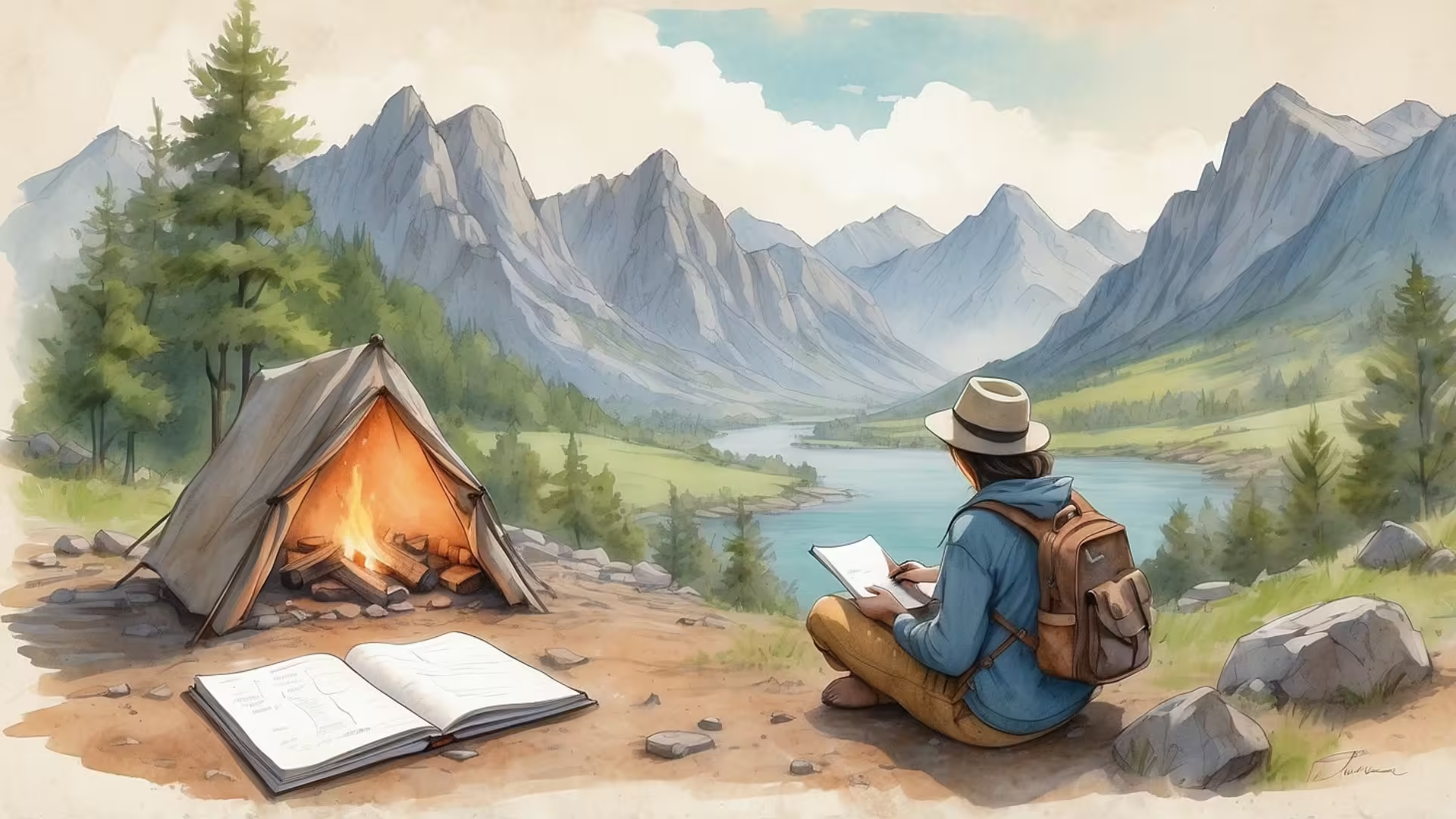The Gist
What Does a Travel Writer Do?
A travel writer is more than just a tourist with a pen. Their job is to observe and experience destinations in a way that connects with readers. They aim to transport readers to a place through vivid descriptions, insider knowledge, and storytelling that captures not just the physical beauty but also the cultural essence of each location. Whether it’s through blog posts, magazine articles, or guidebooks, travel writers provide a lens into new places, offering practical tips alongside personal reflections.
The work varies—one day, a travel writer might be sipping coffee at a Parisian café, jotting down notes on the ambiance, and the next, they’re hiking up a remote trail to capture a stunning sunrise. Some writers focus on luxury travel, while others dive into backpacking, sustainable tourism, or adventure travel. The diversity in travel writing means there’s no one-size-fits-all job description—it’s as wide as the world itself.
The Skills Every Travel Writer Needs
Being a successful travel writer takes more than just wanderlust. Writing skills are at the core of the profession—capturing a place in words requires creativity, precision, and an eye for detail. Strong storytelling can turn an ordinary experience into an unforgettable narrative. Beyond writing, travel writers need research skills to gather accurate information and cultural awareness to write respectfully about the places they visit.
Photography is another valuable skill, as many publications expect writers to accompany their work with compelling visuals. Being adaptable and organized also goes a long way. Traveling can be unpredictable—missed flights, language barriers, or sudden weather changes can disrupt plans. A great travel writer knows how to adapt, find solutions, and still meet deadlines.
The Challenges of Travel Writing
While the job sounds glamorous, it comes with its share of challenges. Travel writers often work as freelancers, meaning income can be inconsistent, and they must constantly pitch ideas to editors. It’s not just about traveling; it’s about creating marketable content that publications or websites want to publish. Writers also face the challenge of staying authentic. When every destination has been photographed and written about countless times, how do you make your story stand out?
Another challenge is balancing work and travel. Exploring a new place is exciting, but travel writers are always working in the background—taking notes, snapping photos, and thinking about the angle for their next piece. It can be hard to fully relax when your job is to observe everything around you with a writer’s eye.
The Joys and Rewards of Travel Writing
Despite the challenges, the rewards of being a travel writer are undeniable. The opportunity to explore different cultures, meet people from all walks of life, and experience the world firsthand is a dream for many. Travel writers get to step out of their comfort zones, discovering new perspectives along the way. There’s also a unique satisfaction in inspiring others to travel, helping them see the world through fresh eyes or discover hidden gems.
For many travel writers, the real joy lies in the stories that unfold unexpectedly—like a chance encounter with a local who shares a secret spot or a festival they stumbled upon by accident. These unscripted moments add depth to their work and become the heart of their stories.
How to Get Started as a Travel Writer
Becoming a travel writer doesn’t require a specific degree, but a background in writing, journalism, or communications can help. Many writers start with a personal travel blog to showcase their work and build a portfolio. Networking with editors and other writers is essential, as is learning to pitch story ideas effectively. The more specific the angle, the better—publications love stories that offer a fresh perspective.
It’s also helpful to specialize in a niche. Whether it’s eco-tourism, culinary travel, or solo adventures, having a niche helps establish you as an expert in that area. Building an online presence through social media or a personal website can also open doors, as many travel writers are expected to engage with readers and promote their work online.
Seeing the World with New Eyes
Travel writing offers more than just a career—it’s a way of life. It’s about learning to see the world not just as a series of destinations but as a collection of stories waiting to be told. Through their words, travel writers inspire others to explore, connect, and discover. And along the way, they gain something even more valuable than travel itself—a deeper understanding of the world and their place in it.
Let’s Talk
Travel writing sounds like a dream, doesn’t it? Exploring the world, meeting new people, and capturing those experiences in words. But here’s the thing—there’s a lot more going on behind the scenes than meets the eye. It’s not just hopping on a plane and waiting for inspiration to strike. In reality, travel writers are always working, even when it looks like they’re on vacation. Every meal, every stroll through a new city, every conversation with a local—those moments are potential material for the next story. Have you ever taken a trip where you felt like you had to be “on” the entire time? That’s kind of how it is for travel writers.
One of the things I find fascinating is how travel writing forces you to see the world differently. When you travel just for fun, you might enjoy a sunset or a charming street, and that’s it. But as a writer, you’re constantly asking yourself, What makes this moment special? What’s the story here? You’re not just taking in the sights—you’re looking for meaning, for the details that make a place come alive on the page. And that can be both exciting and exhausting. How do you think your travel experiences would change if you had to look at everything through a storyteller’s lens?
There’s also the challenge of authenticity. It’s easy to fall into clichés—“breathtaking views,” “hidden gems,” and “a melting pot of cultures” are phrases that get thrown around a lot. But the best travel writers dig deeper. They show you the cracks in the perfect facade, the stories behind the postcard moments. It makes me wonder: When you read about a place, do you prefer polished travel brochures, or do you want to hear the raw, unfiltered stories—the ones with both the beauty and the messiness?
And let’s not forget the personal side of travel writing. It’s not all about the destinations—it’s also about the writer’s own journey. Traveling to new places challenges you to step out of your comfort zone, meet people from different backgrounds, and rethink your assumptions about the world. Have you ever had a travel experience that changed the way you see things—maybe opened your eyes to a new culture or way of life?
But here’s the tricky part: when travel becomes your job, how do you keep it from losing its magic? How do you stay curious and inspired when travel isn’t just a break from routine but is the routine? That’s where balance comes in—finding ways to explore not just for work, but for the pure joy of it. Maybe it’s about taking moments to disconnect, to wander without an agenda. Or maybe it’s about finding joy in the unexpected—like a wrong turn that leads to the best café you’ve ever visited. Ever had one of those moments where getting lost ended up being the highlight of your trip?
Travel writing, at its best, teaches us that every place has a story, and every person we meet can offer a new perspective. It’s not just about the places you visit—it’s about the connections you make along the way. So here’s a thought: What’s one story from your travels that has stayed with you? And if you were to write about a place you love, how would you capture its essence in a way that no one else could? Because, in the end, travel writing isn’t just about showing people where to go—it’s about helping them see the world through new eyes.
Let’s Learn Vocabulary in Context
Let’s take a closer look at some of the key words and phrases from our discussion about travel writing and see how they work both in the context of storytelling and everyday life. First up, we have wanderlust. It’s that deep desire to travel, explore, and experience new things. You know that feeling when you scroll through pictures of beautiful beaches or ancient cities, and suddenly you’re daydreaming about booking a flight? That’s wanderlust kicking in. It’s not just limited to big international trips—it can be about discovering new places right in your own city. Have you ever felt that itch to just get out and explore somewhere new?
Next, we have storyteller’s lens, which is about seeing the world with curiosity, always looking for meaning or a unique angle. In travel writing, it’s not enough to just say a place is beautiful—you’ve got to dig deeper and capture what makes it special. But this idea of a storyteller’s lens isn’t just for writers. In everyday life, it’s about paying attention to details, like noticing the way the light hits the trees in the morning or the little quirks that make a café feel cozy. It’s about appreciating the small things that make life interesting. When was the last time you noticed something ordinary and saw it in a new light?
Authenticity is another important word we touched on. In the context of travel writing, authenticity is about telling real, honest stories instead of falling back on clichés or polished travel narratives. But this idea applies beyond writing, too. It’s about showing up as your true self, whether that’s in a conversation with a friend or posting on social media without worrying about filters or perfection. When do you feel most authentic—like you’re being fully yourself without holding back?
Now, let’s talk about niche. In travel writing, having a niche means focusing on a specific type of travel—maybe eco-tourism, food travel, or solo adventures. In life, your niche is often the thing you’re passionate about or really good at. It’s that thing people come to you for advice on or that hobby you could talk about for hours. Knowing your niche helps you stand out and find your path. Have you found your niche yet—either in your work or personal life?
Finally, we’ve got perspective. Travel writing is all about capturing different perspectives—whether that’s the view from a mountain peak or the experience of a local market. But beyond travel, perspective is about seeing things from another person’s point of view, which can be so valuable in everyday interactions. Think about a time when you shifted your perspective on something—maybe a conversation that changed your opinion or a situation where seeing it from another angle made all the difference. What did that teach you?
So here are a couple of questions to think about: What’s one way you could apply a storyteller’s lens in your daily life to notice more of the world around you? And how do you practice authenticity—whether in writing, travel, or your relationships? These words—wanderlust, storyteller’s lens, authenticity, niche, and perspective—remind us that travel writing isn’t just about places on a map. It’s about how we engage with the world, both near and far.










0 Comments